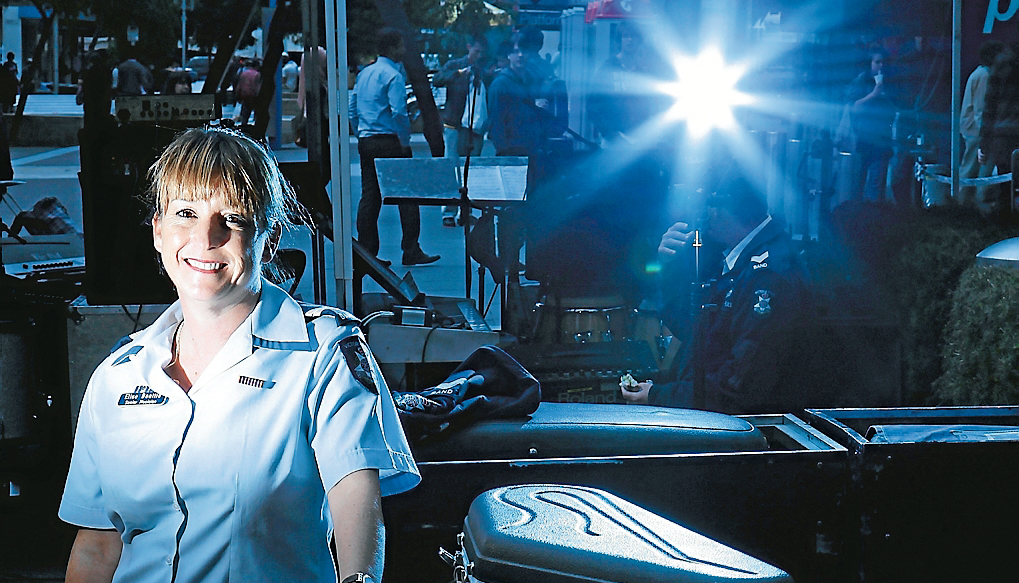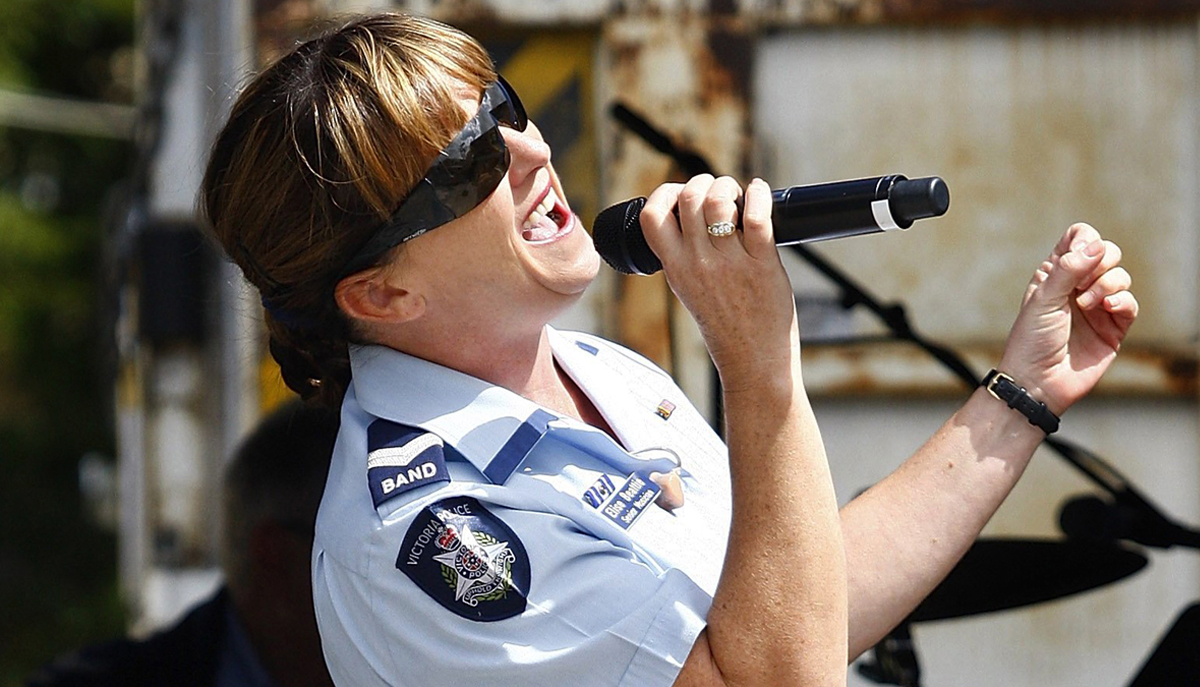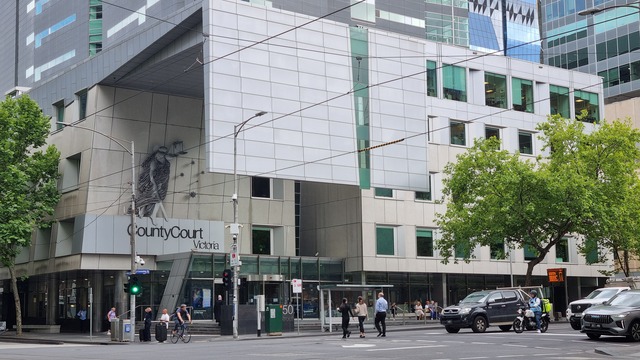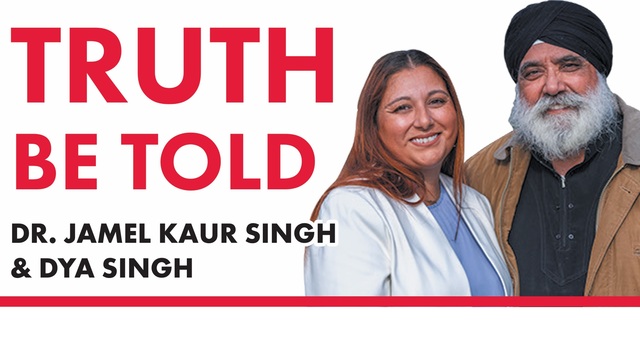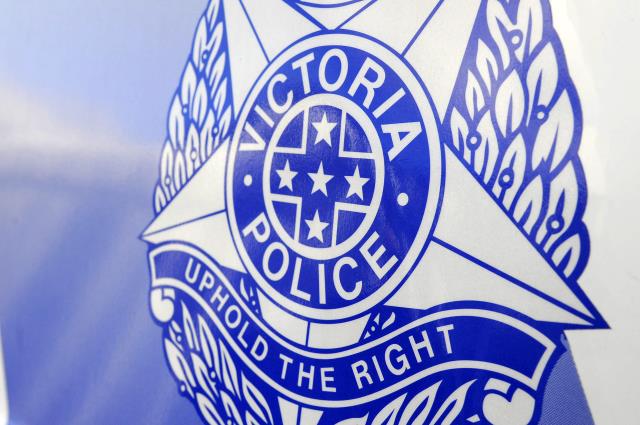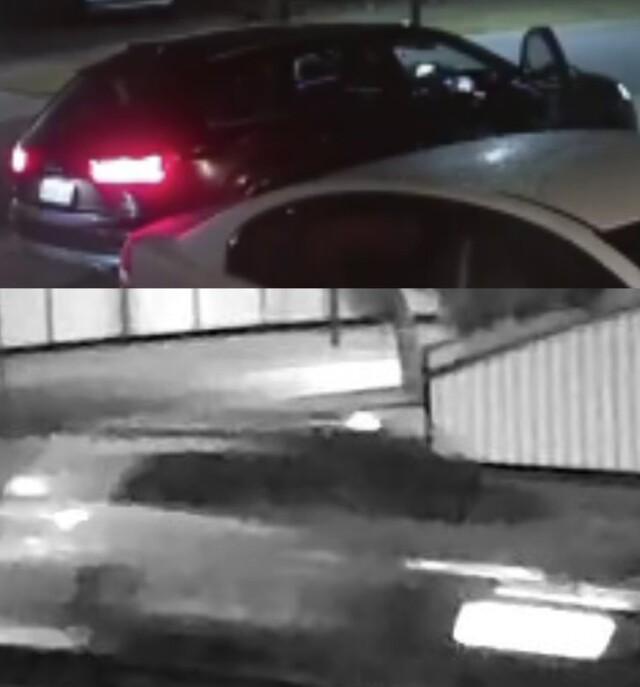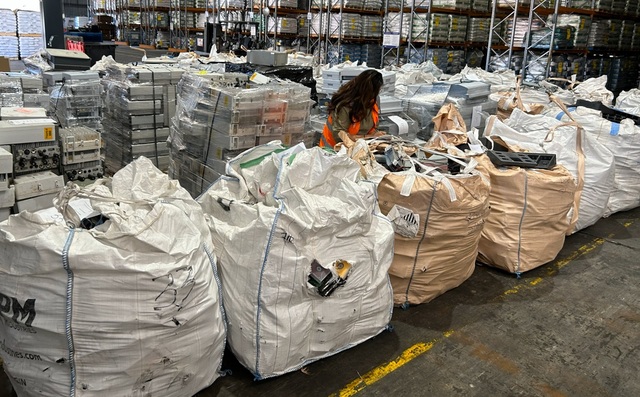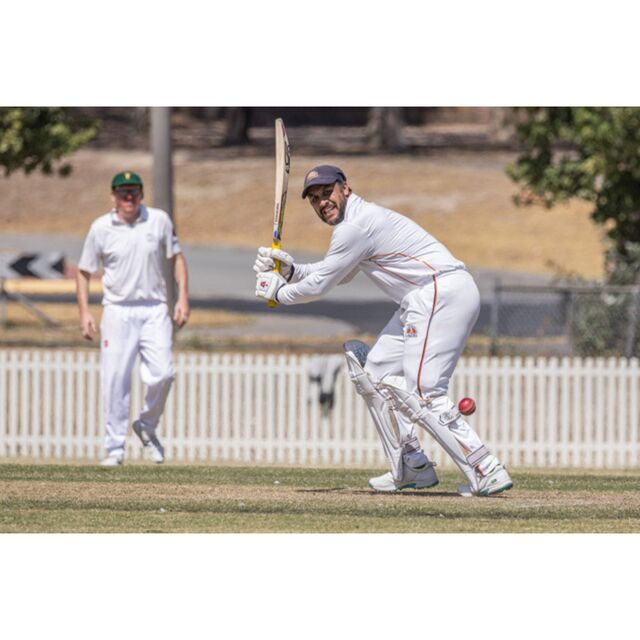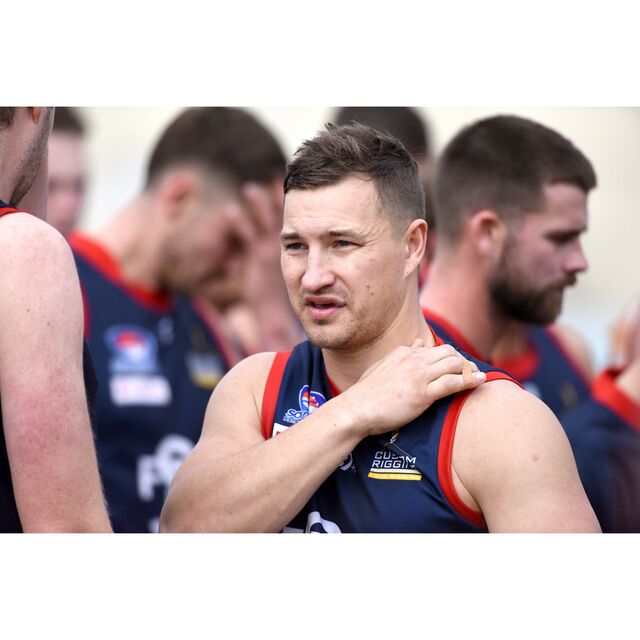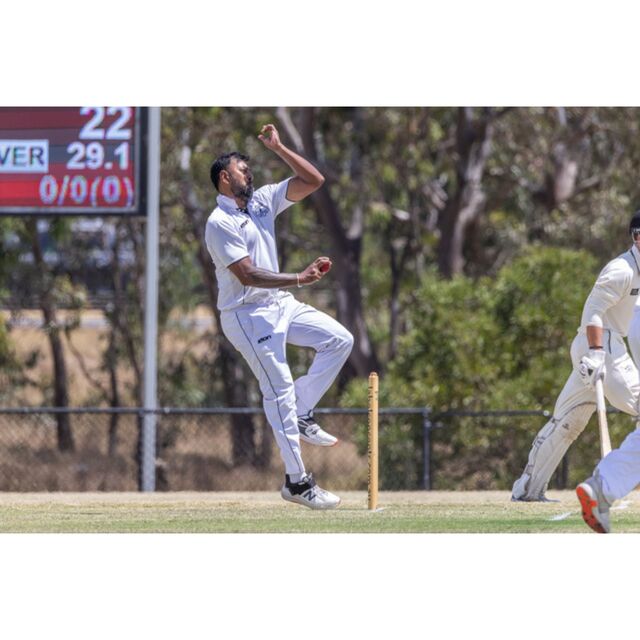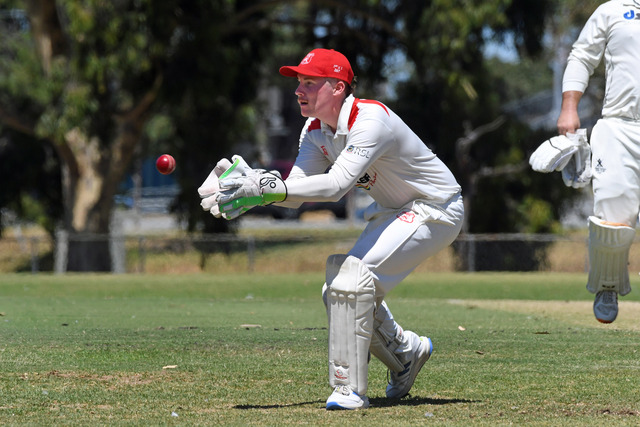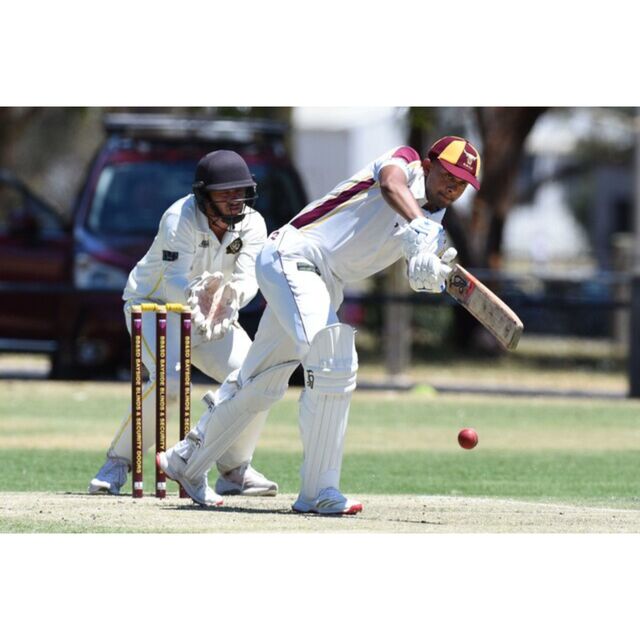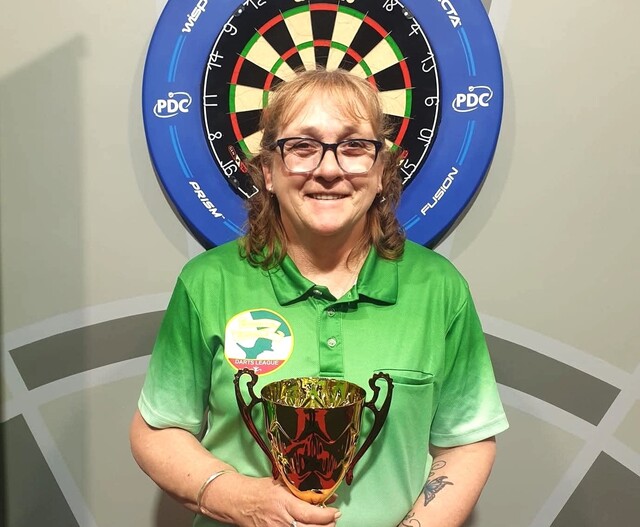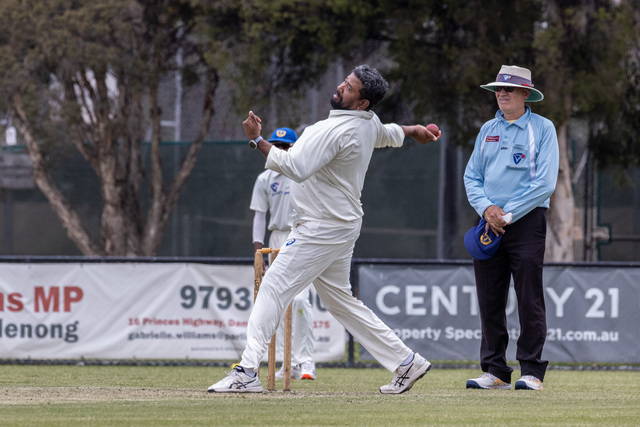By Loretta Hall
It can be a glamorous life fronting a showband, but this is not one of those days – the band’s equipment truck, emptied of trunks of brass instruments and sound gear, doubles as a hasty change-room for Elise Beattie as she transforms from “worker ant” roadie to lead singer in a shopping mall in Melbourne’s east.
Long loose hair is secured in a no-nonsense plait, and casual clothing discarded for navy trousers, sensible flat black shoes and a crisp light-blue shirt with an epaulette and stripe on each shoulder.
Only the showbiz shades remain from her civilian guise as Beattie prepares to front the Victoria Police Showband with fellow senior constable Daina Jowsey under the midday sun for the mostly unsuspecting shoppers and commuters of Box Hill.
Music director (and prominent Melbourne musician) Daryl McKenzie is absent, so Beattie and Jowsey consult over a whiteboard song list and a takeaway coffee while fellow band members set up 500 leads and an array of instruments for the gig.
They choose songs from hundreds of the band’s own arrangements, mixing swing with jazz, classical, musical theatre, rock and pop. Beattie is down for Adele’s Rolling in the Deep, Jowsey is opening with Dancing in the Street.
Together. they will close with what Beattie says is a crowd favourite, The Flower Duet, a soaring soprano aria from French opera Lakme. It is one of the tracks they performed for the Showband’s Divas CD, sales of which aid the police force’s Blue Ribbon Foundation community program.
There are a few curious glances from passers-by as Beattie completes her assigned chores and sets up the microphones. But once she emerges from the back of the truck an audience begins to gather and several shoppers question the diminutive but authoritative figure at the microphone stand.
“As soon as you are in uniform there’s a certain level of interest; people come up and ask what you are doing,” Beattie says. “We explain to them that what we are doing is a full-time job.”
It has been a full-time occupation since the 1980s, when professional musicians were first sworn in as police members. When the police band originated 120 years ago it was formed by those on the beat who volunteered to play an instrument part-time.
In the 1980s, Beattie was singing Grizabella’s Memory from the musical Cats on Box Hill school Our Lady of Sion College’s stage, dressed in a black leotard with a newspaper-stuffed tail.
“It’s not like it was here when I was at school [in Box Hill],” Beattie says. “It’s a bit different now; there is a big drug problem and a lot of youth unemployment.
“In the break, people talk about bad experiences they have had living around here, and their experiences with police. You get comments like, ‘I usually hate coppers but youse are all right’.
“A lot of what we do is PR, and the music reaches people and you see smiles on their faces. Our primary role is to perform for graduations and police functions, but otherwise we perform at anything community-based that benefits the community.”
The showband plays across Melbourne and regional Victoria and its members come from all suburbs across Melbourne, from Eltham to Sandringham. Gig locations this year have included the city’s Federation Square, Nunawading, Ashburton, St Kilda, Williamstown, Frankston, Emerald Lake, Geelong, Swan Hill and Castlemaine.
There are school performances, too, and the public can check the police website for the showband’s calendar for a performance in their neighbourhood.
More glitzy gigs include charity nights, when Beattie frocks up to perform at venues that have included Crown’s Palladium room, Hamer Hall and Melbourne’s World Congress Centre.
Beattie, 46, has been on patrol with the showband around Victoria for 11 years and previously sang with the Victoria Police’s rock band Code One for six years. In January, her role in the police force was recognised with a national award for “rockin’ it”.
She wears the stripe of a senior constable “and we have full police powers of arrest”. But, as with the rest of the 24 showband members, Beattie says she is not operational as a police officer.
Band leader Sergeant Pat Hudson, who has in the past been in the back-row line-up on trombone, watches from beyond the police-taped stage edge as the party gets started.
Music spills into the mall and an audience builds. Most of the smoking section — a half-brick wall outside the supermarket — is full. Hudson says that at the height of the set about 200 people are toe-tapping to the tunes.
The youth of Box Hill that the showband is reaching out to largely respond to the offer of musical friendship, with most unplugging at least one earphone to catch a Lady Gaga or Beyonce song.
An older fan, Robert Fraser, 59, dances through all three sets, oblivious to the fact he is mostly dancing solo on the pavement. Fraser is a regular at showband gigs, says Hudson.
A middle-aged woman kicks off her heels, dumps her handbag under the watchful gaze of the band’s brass section and joins him for a track. Towards the end of the last set, a trio of teens lose their inhibitions and let their lanky limbs loose.
Fans can find performance dates on the police website, which also lists gigs for the other two police bands, Code One and the Victoria Police Pipe Band, which brings bagpipes and drums to many Melbourne parades.
Collectively, the three bands perform about 500 gigs a year and reach about 650,000 Victorians a year. “One of the things the band does is to go find people who can’t come to us,” Hudson says. “Often it’s in an unstable environment not particularly conducive to bands.”
In times of hardship and disaster, the showband is dispatched to communities where an uplifting tune can bring some cheer or relief in tough times.
“When there were floods in country Victoria a year ago we had a week-long tour in those regions and based ourselves in Horsham. We were bused out to country towns I had never heard of and all 50 people in the town came to see us. When we do a show for them it’s the only thing that has made them smile in a long time.”
The performances are not all about the music and Beattie spends a lot of time talking to locals. “That’s experiential contact,” says Hudson. “The audience doesn’t just see a copper in a uniform. They see Elise sing and talk to them and take a positive experience from it.”
Beattie recalls a big community memorial service after the 9/11 attacks in the US. “Lots of American expats and government officials were there. I sang the Australian anthem and Daina sang the American anthem. It was one of the hardest things I have had to do. There was not a dry eye in the place.
“After events like that you go home and have a cry. At those emotional gigs, that’s when your professional experience comes flooding back because you have got to concentrate on getting the job done.”
In addition to Cats, Beattie took lead roles in her school’s Gilbert and Sullivan productions and studied voice at Melba Conservatorium and primary teaching in music at Victoria College. She gained professional experience with Dame Joan Sutherland in Othello for the Australian Opera (now Opera Australia) and with The Wiggles in front of a crowd of 80,000.
“I still have singing lessons because it is important that our music is as high a standard as it can be,” Beattie says. “Being with the band involves a regimented lifestyle, especially for the singers to stay fit and healthy.
“In a 10-day fortnight we get four days off, and those 10 days can be at any time. We spend many hours travelling . . . being on tour with the band on the bus is like being in a sitcom. There are some incredibly funny personalities.”

